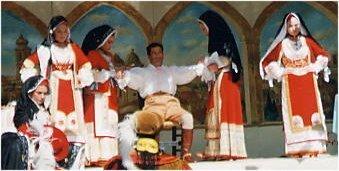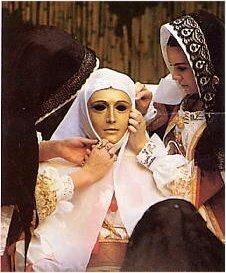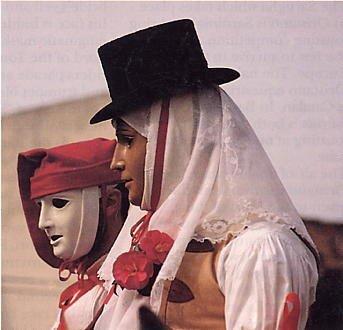Masks in Sardinia
back to
"The
Story
of the Mask"
|
Masks in Sardinia |
back to |
> La
Sartiglia
by Anna Sacripanti
«at Oristano, one of Europe's last ring jousting competitions»
The
Sartiglia which takes place in Oristano is Sardinia’s last ring jousting
competition and one of the few to survive in ancient Europe. The name of the
Oristano equestrian tournament is Catalan. In Barcelona, the Sartilla is both ring and ring jousting at one and the same time.
The air of Spain infuses the Oristano carnival from the name given to the Lord
of the Tournament, the “Componidori” (from the Spanish Componedor) to the costumes worn by the riders, the sword, and the
wooden pole (the “Stoccu” from the Spanish Estoque)
used by the riders to pick up the star shaped ring.
The contest takes piace on the last Sunday of carnival and Shrove Tuesday
(February 9th
and 11th,
1997) in the Ruga di Santa Maria (Strada di Santa Maria, now Via Duomo), between
the ancient palace of the kings of Arborea (Piazza Manno), the Cattedrale della
Vergine Assunta (where the star hangs suspended on a ribbon) and the Gothic
church di San Francesco, where it has been held for centuries.
The “Componidori” is dressed by young girls overseen by an older woman
according to an age-old ritual. He wears a deerskin tunic over a linen shirt
tied with colored bows. On his head is a
On the cry of “Su Componidori”, he sets off with his sword pointed towards
the star. A cry of joy greets a victory, a disappointed murmur marks a missed
target. Then it is the turn of the second and of the other riders who are handed
the sword by the Compouidori. Finally the Lord of the Tournament grips the shaft
for a new descent, followed by bis second.
Finally the Lord of the Tournament grips the shaft
for a new descent, followed by bis second.
The last race known as the “Sa Remada” is his and bis alone. Lying on the
back of a horse set off at a mad gallop, “Su Componidori” clutching a
sceptre of periwinkle and violets (known as “Sa Pippia de Maiu”) blesses the
crowds. The Sartiglia is over.
The event has taken place for more than four and a half centuries. It was
started by Canon Giovanni Dessi, perhaps in 1543. Since then, two guilds (“gremi”)
of farmers and carpenters have organized respectively the tournaments on Sunday
and Tuesday.